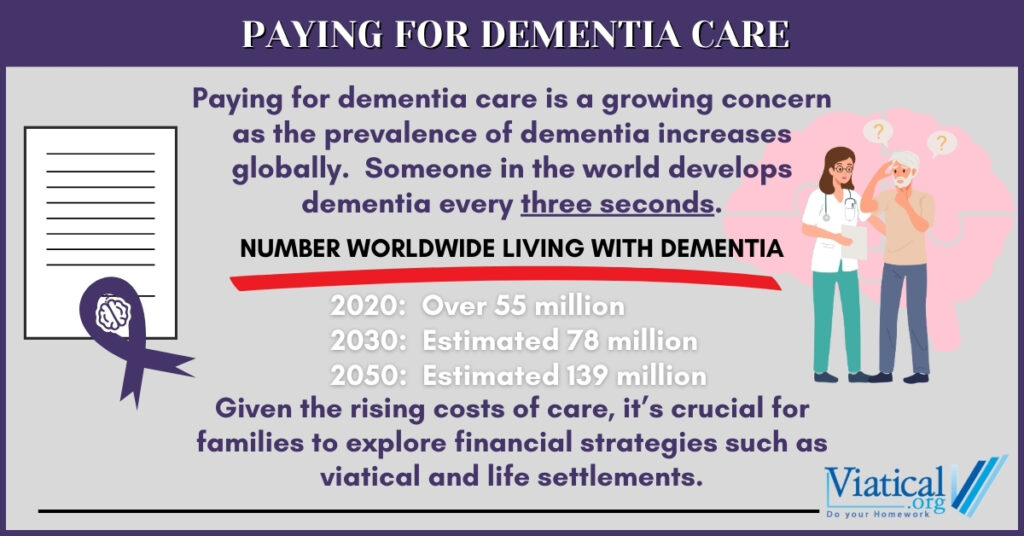Paying for dementia care is a growing concern as the prevalence of dementia increases globally. Someone in the world develops dementia every three seconds, and in 2020, there were over 55 million people living with this condition. This number is projected to nearly double every 20 years, reaching 78 million in 2030 and 139 million in 2050. Given the rising costs of care, it’s crucial for families to explore financial strategies such a viatical settlement or life settlements by working with life settlement companies.

Dementia Medications and Treatments
Dementia treatments and their associated costs vary widely depending on the type of dementia, the severity of symptoms, and the specific treatments used. Below are some common dementia treatments.
Medications
- Cholinesterase Inhibitors (e.g., Donepezil, Rivastigmine, Galantamine)
- Used to treat symptoms of Alzheimer’s disease and other dementias by increasing the levels of neurotransmitters in the brain.
- Memantine (Namenda)
- Helps manage symptoms in moderate to severe Alzheimer’s disease by regulating glutamate, a chemical involved in learning and memory.
- Antidepressants, Antipsychotics, and Mood Stabilizers
- Used to manage behavioral and psychological symptoms such as depression, agitation, and psychosis.
Non-Medical Therapies
- Cognitive Behavioral Therapy (CBT)
- Helps manage symptoms such as anxiety, depression, and behavioral issues.
- Occupational Therapy
- Helps patients maintain daily living skills and adapt to changes in their abilities.
- Speech Therapy
- Assists with communication difficulties and swallowing problems that may arise with dementia.
Specialized Care Facilities
- Assisted Living Facilities
- Provide housing, meals, personal care, and medical services. Some facilities specialize in memory care for dementia patients.
- Cost: $4,000 to $7,000 per month, depending on the level of care required and the facility’s location.
- Nursing Homes
- Offer more intensive medical care and supervision, suitable for patients with advanced dementia.
- Cost: $7,000 to $10,000 per month or more, depending on the level of care and location.
- In-Home Care
- Includes services like personal care, companionship, and skilled nursing care in the patient’s home.
- Cost: $20 to $40 per hour for personal care; skilled nursing care can cost $100 or more per hour.
Alternative and Complementary Therapies
- Music Therapy, Art Therapy, and Reminiscence Therapy
- Used to improve mood and cognitive function and reduce behavioral symptoms.
- Dietary Supplements and Herbal Remedies
- Some supplements, like omega-3 fatty acids and ginkgo biloba, are thought to have potential benefits for brain health.
Other Expenses
- Medical Appointments and Diagnostics
- Regular visits to healthcare providers and specialists are necessary for managing dementia.
- Cost: Varies based on insurance coverage, location, and type of specialist.
- Home Modifications
- May include installing ramps, grab bars, and other safety features to accommodate mobility issues.
- Cost: $1,000 to $10,000 or more depending on the extent of modifications needed.
Considerations for Cost Management
The costs associated with dementia treatment can be substantial. Families often need to explore various financial options, such as long-term care insurance, Medicaid, Medicare, and other state and federal programs, to help cover these expenses. Additionally, exploring financial strategies like life settlements or viatical settlements can provide much-needed funds for managing the costs of dementia care.
Viatical Settlements and Life Settlements
Viatical settlements and life settlements are viable options for accessing funds to pay for dementia care. In a viatical settlement, a person with a terminal illness, such as advanced dementia or Alzheimer’s, sells their life insurance policy to a third party—often a life settlement company—in exchange for a lump sum payment. This payment is typically higher than the policy’s cash surrender value but less than the death benefit. The funds received can be used to cover the significant costs associated with dementia care, including medical treatments, specialized housing, and caregiving services.
Life settlements, while similar, are available to individuals who are not necessarily terminally ill but still wish to sell their life insurance policy. This option allows policyholders to liquidate their policies for cash, which can then be used to manage various expenses. Life settlement companies facilitate these transactions, helping policyholders secure the best possible offer for their policies. This process provides a financial lifeline for those facing the substantial expenses of dementia care, alleviating some of the financial burdens on families.
Choosing the Right Financial Solution
Cash for life insurance through options like viatical settlements and life settlements is a practical solution for many families dealing with the high costs of dementia care. By converting a life insurance policy into immediate cash, policyholders can access essential funds without having to wait for the policy’s maturity. This approach offers a way to manage care expenses effectively, ensuring that individuals receive the necessary support and resources during a challenging time.
Choosing the right financial solution for paying for dementia care requires careful consideration and planning. It’s important to understand the differences between viatical settlements and life settlements, as well as the potential implications of each option. Consulting with financial advisors and working with reputable life settlement companies can help ensure that families make informed decisions that best suit their specific needs.
By exploring options like viatical settlements and life settlements, families can access critical funds to manage the high costs of dementia care. This financial support can make a significant difference in the quality of care and overall well-being of their loved ones, providing peace of mind during a challenging time.
As the number of people living with dementia continues to grow, understanding these financial strategies will become increasingly important. Proper planning and informed decision-making can help families navigate the complex landscape of dementia care, ensuring they can provide the best possible support for their loved ones.
When facing a diagnosis of Dementia or Alzheimer’s, the likelihood that you will be eligible to sell your policy for cash is high. It only takes a 5-minute phone call to learn if you’re likely to qualify. 800-973-8258

